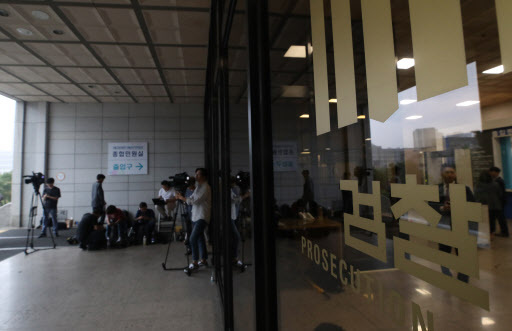The prosecution said Tuesday that it will abolish special investigation divisions under prosecutors’ offices across the country and improve investigation practices in line with the Moon Jae-in administration’s drive to reform the country’s powerful law enforcement body.
 |
(Yonhap) |
Prosecutor-General Yoon Seok-youl ordered the abolition of special investigation divisions -- elite squads of experienced prosecutors charged with investigating high-profile corruption cases -- around the country, except for those under the Seoul Central Prosecutors’ Office and two others.
Yoon’s order came a day after President Moon Jae-in instructed Yoon to map out detailed measures to revamp the prosecution as early as possible to reflect the public’s wishes, following Saturday’s massive candlelight vigil calling for prosecution reform.
The move, however, also comes amid an apparent war of nerves between the presidential office and the prosecution over prosecutors’ escalating investigation into embattled Justice Minister Cho Kuk whose reputation is marred by corruption allegations involving his family.
A media report on Tuesday said Prosecutor General Yoon Seok-youl had hinted he might resign if President Moon Jae-in went ahead with appointing Cho as justice minister.
Yoon reportedly asked for a meeting with Moon to voice his concerns about the allegations against Cho, but his request was denied, according to the report based on quotes from unidentified ruling Democratic Party legislators.
The prosecution has dismissed the report.
On top of abolishing the special investigation units, Yoon ordered prosecutors dispatched to other government agencies to return to prosecutors’ offices, apparently mindful of criticism that the dispatch of the prosecutors served to expand the institution’s influence and solidify its power.
The customary practices of prosecutorial investigations -- from summoning suspects for questioning to making public the criminal charges against the suspects -- and the hierarchical organizational culture will be reviewed and amended to better protect human rights.
The ongoing parliamentary interpellation session, meanwhile, continued to be dominated by opposition parties’ attacks on Cho and the ruling Democratic Party’s defense of the justice minister.
Appearing at a session intended for questions about state affairs affecting education, society and culture, Cho was grilled by opposition lawmakers over his alleged attempt to influence the probe into his family.
“I spoke (to the prosecutor) as a husband, not as a minister,” Cho said at the session. “I have never interrupted the investigations.”
He admitted that he had a phone conversation with the prosecutor in charge of the raid on his home, leading the opposition bloc to file a complaint against him and call for his impeachment.
Prosecutors last week conducted an 11-hour search-and-seizure operation at Cho’s home as part of an investigation into allegations that his family made dubious investments and his daughter’s university application materials were forged.
His wife, Chung Kyung-shim, is expected to be summoned for questioning this week. The prosecution suspects she conspired with one of Cho’s relatives to make dubious investments.
Cho’s younger brother was questioned by the prosecutors Tuesday in connection with separate allegations that he received bribes in return for hiring a teacher.
“The investigation is unnecessarily in the limelight. There is a controversy over the revelation of a criminal charge and some think it is quite excessive,” Prime Minister Lee Nak-yon said at the session, touching on the prosecution’s ongoing investigation.
The prosecution’s investigation has divided the country. Those who support the Moon administration denounce the prosecution for abusing its power, while the opposition bloc claims the government is attempting to influence the probe.
(
laeticia.ock@heraldcorp.com)








![[Today’s K-pop] Blackpink’s Jennie, Lisa invited to Coachella as solo acts](http://res.heraldm.com/phpwas/restmb_idxmake.php?idx=644&simg=/content/image/2024/11/21/20241121050099_0.jpg)